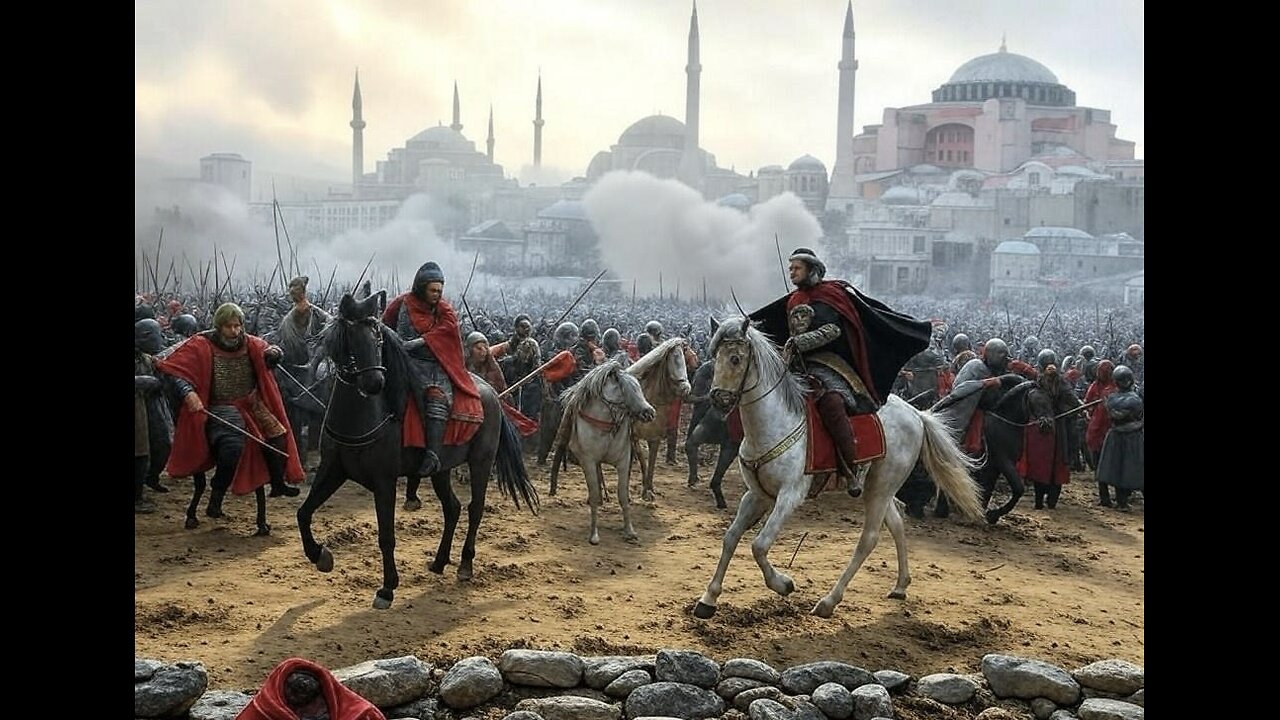Premium Only Content

The fall of Constantinople
The fall of Constantinople, which occurred on May 29, 1453, was a pivotal event marking the end of the Byzantine Empire and the rise of the Ottoman Empire as a major power in Europe and the Near East. Here's a concise description of the event:
The Fall of Constantinople (1453):
- Background: Constantinople, once the grand capital of the Eastern Roman (Byzantine) Empire, had been in decline for centuries due to internal strife, economic troubles, and repeated sieges by various powers. By 1453, it was a shadow of its former glory, with a significantly reduced population and weakened defenses.
- The Siege: The Ottoman Sultan Mehmed II, known as "Mehmed the Conqueror," launched a massive siege on Constantinople. His army, equipped with new technology like large cannons, including the famous "Basilica" cannon, besieged the city. The siege lasted for nearly two months, with several unsuccessful attempts to breach the walls until the final assault.
- The Attack: On the morning of May 29, 1453, after intense bombardment, Ottoman forces managed to breach the walls near the Gate of St. Romanus. Despite fierce resistance, the city's defenders, led by Emperor Constantine XI, were overwhelmed by the sheer numbers and strategic prowess of the Ottoman troops.
- The Capture: Constantine XI died during the battle, and Constantinople fell to the Ottomans. The event is often remembered for the brutal sack of the city that followed, although Mehmed II quickly moved to restore order, converting the Hagia Sophia into a mosque and repopulating the city to reestablish it as the Ottoman capital.
- Consequences:
- Political: The fall of Constantinople ended the Byzantine Empire, which had lasted over 1,000 years. It cemented Ottoman control over the eastern Mediterranean and established Istanbul (renamed from Constantinople) as a major cultural and political center.
- Religious: The event marked a significant shift in the religious landscape, with Islam becoming more dominant in the region. The conversion of Hagia Sophia symbolized this change.
- Cultural: The influx of Greek scholars to the West before and after the fall contributed to the Renaissance, bringing with them ancient texts and knowledge.
- Legacy: This event has been seen through various lenses over time - as a tragic loss for Christendom by some, a glorious conquest by others, and universally as a turning point in world history.
The fall of Constantinople is not just a military event but a profound cultural and historical shift, influencing the course of European, Middle Eastern, and global history.
-
 2:14:50
2:14:50
We Like Shooting
1 day ago $8.28 earnedWe Like Shooting 606 (Gun Podcast)
47.9K5 -
 1:00:41
1:00:41
Donald Trump Jr.
14 hours agoMake Main St Great Again, Interviews with Alex Marlow & John Phillips | TRIGGERED Ep.233
182K55 -
 1:45:23
1:45:23
megimu32
10 hours agoON THE SUBJECT: 2008 Called.. It Wants Its Chaos Back!
60.9K20 -
 1:01:53
1:01:53
BonginoReport
12 hours agoPolitical Violence on the Rise in America - Nightly Scroll w/Hayley Caronia (Ep.26) - 04/14/2025
154K100 -
 1:32:42
1:32:42
BlackDiamondGunsandGear
6 hours agoThey Don’t want you to Purchase 2A Related Products?
43.9K3 -
 2:53:36
2:53:36
Joe Pags
10 hours agoThe Joe Pags Show 4-14-25
105K -
 56:14
56:14
Sarah Westall
10 hours agoGlobal Agenda: Starve Small Business of Funds w/ Bruce De Torres
88.5K23 -
 2:17:29
2:17:29
2 MIKES LIVE
13 hours ago2 MIKES LIVE #205 with guest Nick Adams!
64.6K -
 54:38
54:38
LFA TV
16 hours agoThe Bread of Life | TRUMPET DAILY 4.14.25 7PM
64.8K16 -
 37:52
37:52
Kimberly Guilfoyle
12 hours agoThe Trump Effect, Plus More Scandals for Leticia James, Live with Roger Stone | Ep213
83.1K28